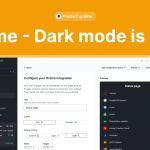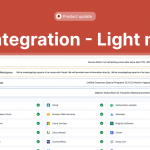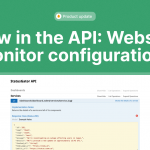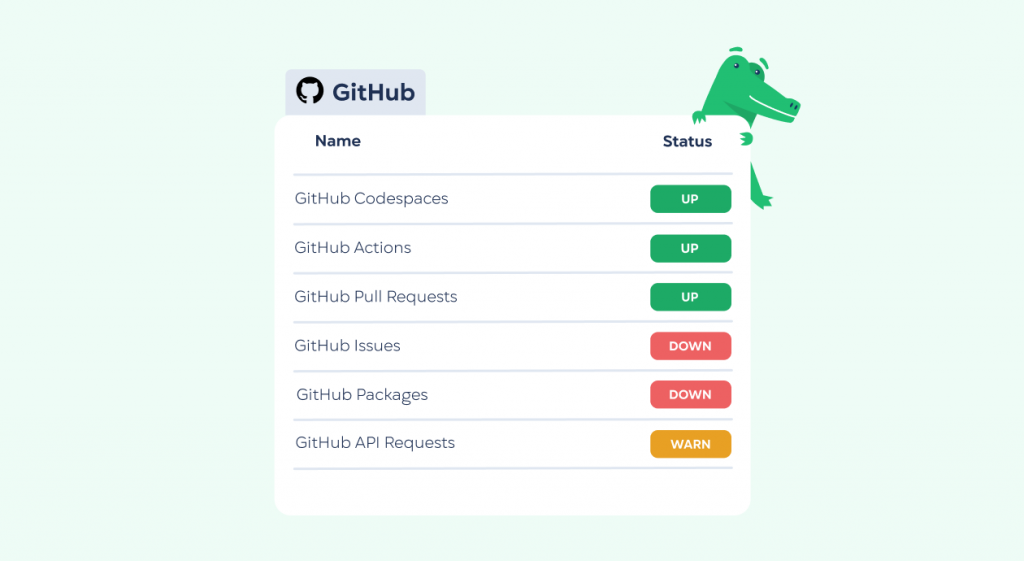
With over 83 million users, GitHub is one of the most popular development tools out there and the third most monitored service on StatusGator. Since so many users depend on GitHub, we wanted to analyze GitHub’s downtime over the past year and see which GitHub features (i.e., Codespaces, PRs, Actions, etc.) were the least reliable.
The Data Behind This Article
To evaluate which GitHub features have been the least reliable, we analyzed the data and duration of all downtime events for each GitHub feature between January 1 and December 31, 2022.
We used historical data from our own product, StatusGator, which aggregates data from official status pages to create team status pages. Our unique dataset allowed us to understand the reliability of all GitHub features.
GitHub’s status page identifies two severity levels for each downtime event. These are degraded performance (marked in yellow) and degraded availability (marked in red).
StatusGator categorizes yellow downtime as “warn” and red as “down.” This article will refer to warn events as minor incidents and down events as major outages.
GitHub Features Status Overview in 2022
GitHub provides status updates for 10 features on its status page, and StatusGator offers a granular look into these 10 GitHub features.
The GitHub status page shows incident history across all features together. StatusGator, however, can provide incident history for specific features.
For a quick overview of the incident history, StatusGator also provides a cumulative view of outage issues from the prior 3 months.
GitHub Features that Experienced Major Outages Most Frequently
We looked at GitHub features separately to determine which experienced the most outages and the longest cumulative outage duration.
| Feature | Major outages | Total duration |
|---|---|---|
| Codespaces | 7 | 13:37:00 |
| Actions | 7 | 2:41:00 |
| Packages | 4 | 2:10:00 |
| Issues | 3 | 1:11:00 |
| Pull Requests | 2 | 0:31:00 |
| API Requests | 1 | 0:45:00 |
| Webhooks | 1 | 0:05:00 |
| Pages | 1 | 0:15:00 |
| Git Operations | 1 | 0:15:00 |
| Copilot | 1 | 0:25:00 |
| Grand Total | 29 | 21:55:00 |
From this data, it’s clear that Codespaces was the least reliable feature, with the highest major outage duration (13 hours and 37 minutes), a significantly larger value compared to Actions. With the same number of major outages, Action’s total outage duration was 2 hours 41 minutes.
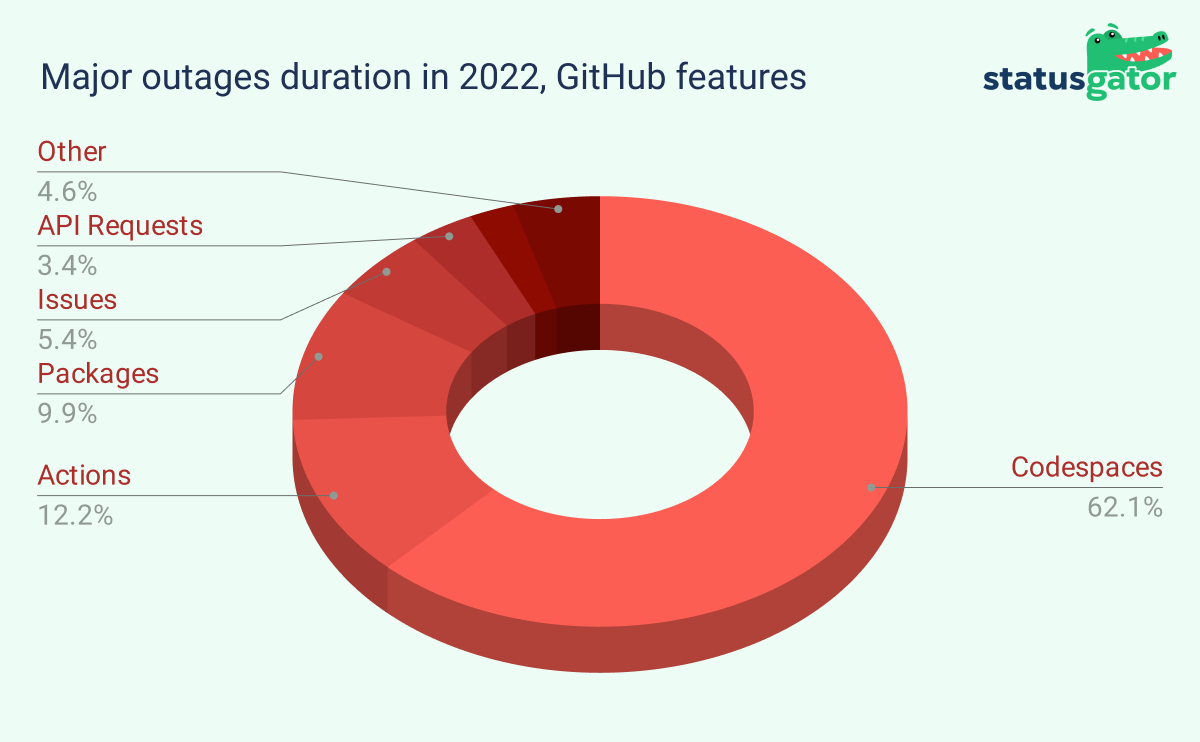
Codespaces accounted for 62.1% of the total outage duration, while Action accounted for only 12.2%.
GitHub Features that Experienced Minor Incidents Most Often
We approached minor incidents for GitHub features the same way.
| Feature | Minor incidents | Total duration |
|---|---|---|
| Codespaces | 43 | 76:45:00 |
| Actions | 44 | 76:16:00 |
| Packages | 21 | 27:26:00 |
| Issues | 21 | 25:21:00 |
| Pull Requests | 20 | 24:13:00 |
| API Requests | 12 | 23:36:00 |
| Webhooks | 22 | 21:45:00 |
| Pages | 12 | 13:16:00 |
| Git Operations | 13 | 11:26:00 |
| Copilot | 6 | 4:50:00 |
| Grand Total | 214 | 304:54:00 |
Similar to major outages, Codespaces and Actions had the highest number of minor incidents. When looking at the duration, there was no significant difference between Actions and Codespaces minor incidents: both amounted to 76 hours, with each accounting for approximately 25% of the total outage duration.
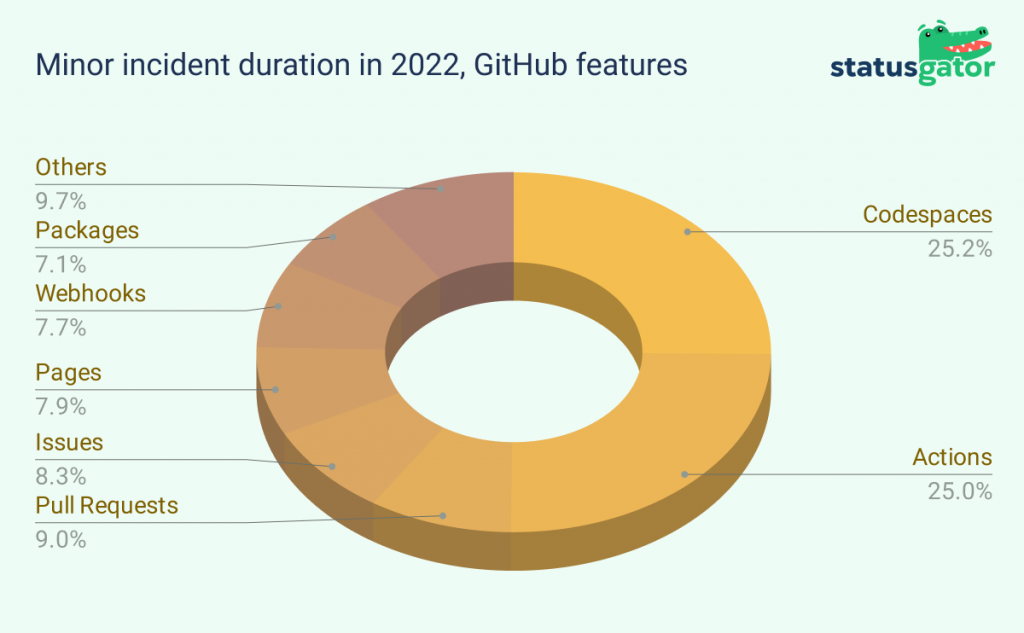
Most Unreliable GitHub Features – Overview
#1 Worst Feature – Codespaces Major Outage and Minor Incidents
We begin with Codespaces, as it was the feature with the most events for both major outages and minor incidents.
Codespaces is a development environment hosted by GitHub in the cloud. GitHub Codespaces can also be used for teaching. With that in mind, what can happen if Codespaces experiences an outage?

Why Is Codespaces Downtime Important?
If Codespaces is down, there is no environment to work and teach in, reducing productivity and efficiency and wasting time and money on projects of all sizes.
Top 3 Reasons for Codespaces Major Outages
Having scanned through the status updates from GitHub, there were no specific reasons or explanations as to why major outages occurred. Usually, the message was “We are investigating reports of degraded performance for Codespaces.” We would like to see more transparency from GitHub.
Top 3 Longest Codespaces Major Outages
| Date | Duration | Update on the major outage |
|---|---|---|
| August 29, 2022 | 4 hours | Degraded performance |
| October 12, 2022 | 2 hours 55 minutes | Degraded availability |
| April 1, 2022 | 2 hours 37 minutes | Degraded availability |
Historical Analysis of Codespaces Downtime
The major outage data shows that 7 key outage events occurred between April and October. October had two major outage events and reached the highest duration. April and August also saw spikes in longer outages.
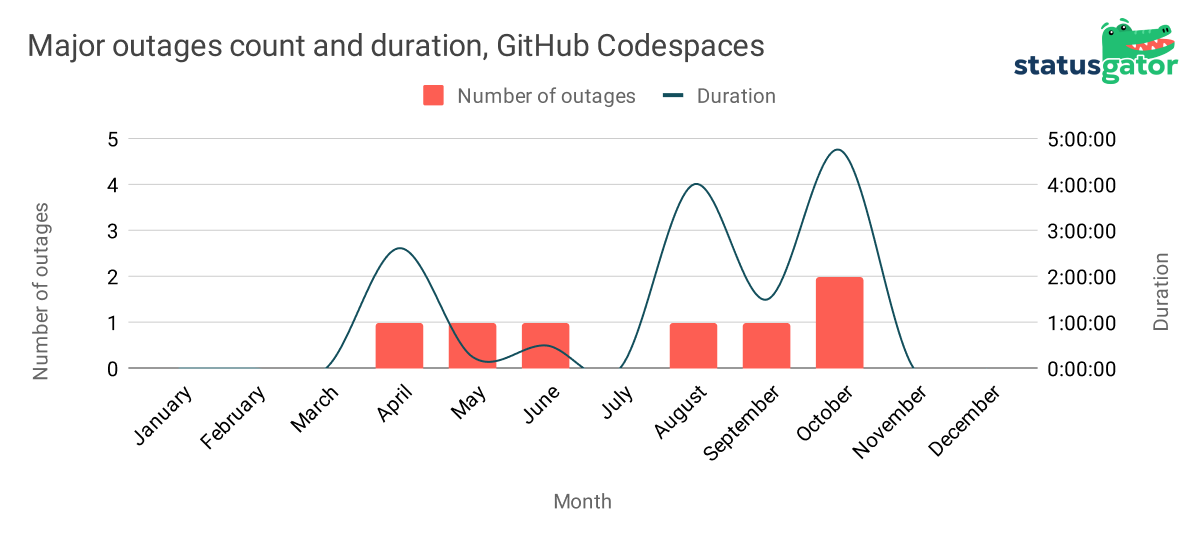
Looking at the minor incident data, we see at least one incident per month. Higher incident numbers were observed from February through March and August through November.
As for the duration, minor incidents lasted less than 10 hours in total for all months except for April.
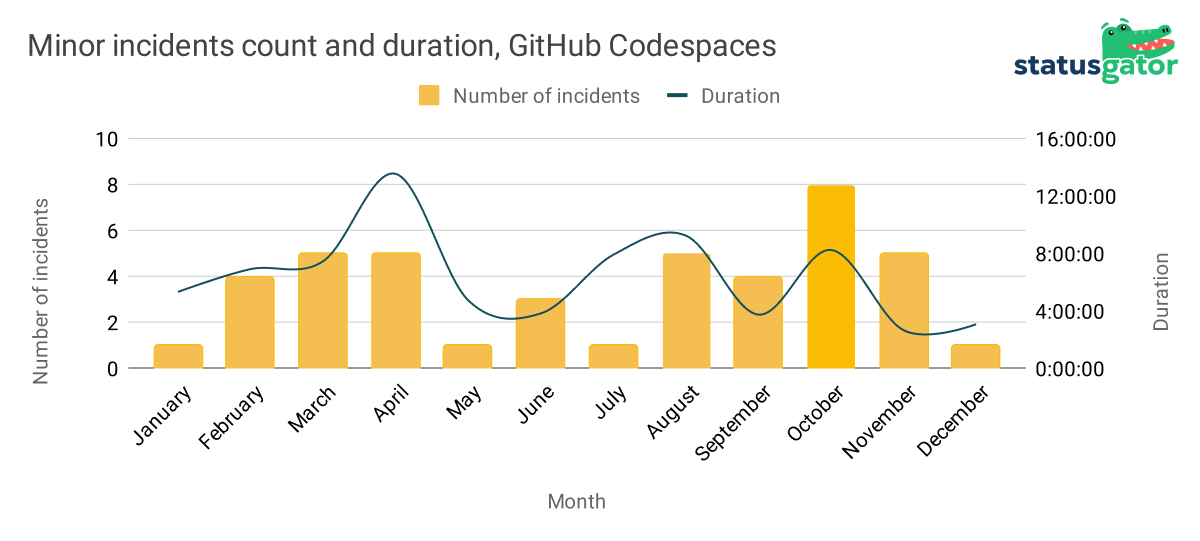
#2 Worst Feature – Actions Major Outages and Minor Incidents
GitHub Actions is a continuous integration and delivery (CI/CD) tool provided by GitHub that allows users to automate workflows. It’s uses are extremely varied because Actions is so flexible but most commonly Actions is used for running tests and deploying code.
Why Is Actions Downtime Important?
Deployments cannot be run if Actions is down, which means any issues or errors with code cannot be fixed until it returns. Automated tasks and third-party tools cannot be used, which can significantly delay development, leading to lost time and money. If your project uses Actions to deploys, any outage can be a significant business disruption.
Top 3 Reasons for Actions Major Outages
GitHub’s Action status history does not provide high levels of information to explain its outages. The most common was “degraded performance,” though “degraded availability” was also abundant.
Top 3 Longest Actions Major Outages
Compared to Codespaces, Actions major outages were shorter.
| Date | Duration | Update on the major outage |
|---|---|---|
| June 1, 2022 | 40 minutes | Degraded availability |
| October 5, 2022 | 35 minutes | Degraded availability |
| June 29, 2022 | 30 minutes | Degraded performance and availability affecting API Requests, Codespaces, Git Operations, GitHub Packages, and GitHub Pages too |
Historical Analysis of Actions Downtime
Major outages occurred in the first half of the year, with only one outage in October. June and March had the highest frequency of major outages, with June having the highest total outage duration.
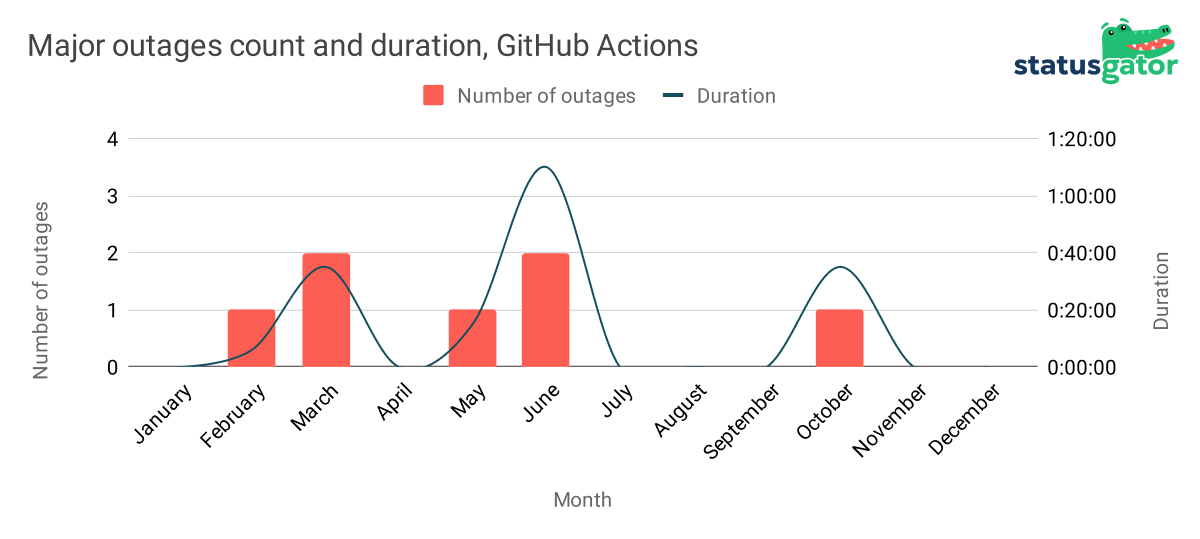
Every month other than December experienced a minor incident, but only March and June appear to surpass 5 minor incidents. The highest number of incidents (10) occurred in March.
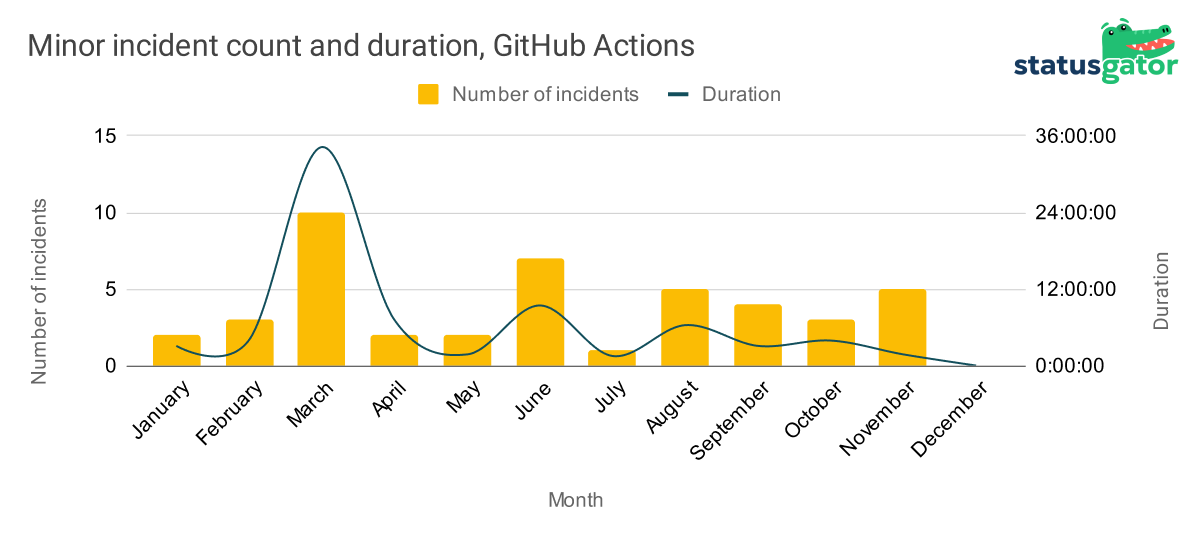
#3 Worst Feature – Packages Outages and Incidents
Since Packages is a platform for hosting and managing packages such as private software dependencies shared across many system, it’s no surprise that any Packages outage would be disruptive.
Why Is Packages Downtime Important?
When Packages is down, your company’s shared packages and dependencies become unavailable. Similarly to Actions outages, deployment and development workflows can be heavily affected, issues cannot be addressed, and development grinds to a halt.
Top 3 Reasons for Packages Major Outage
Similar to Codespaces and Actions, there was little information available regarding outage details. “Degraded performance” was the usual explanation for most downtime events throughout the year. Again, transparency from GitHub here would be beneficial.
Top 3 Longest Packages Major Outages
When looking at the outage data, there were only four outage events recorded, none of which lasted longer than an hour. The longest three outage events, however, were the following:
| Date | Duration | Update on the major outage |
|---|---|---|
| April 25, 2022 | 45 minutes | Degraded performance/availability |
| November 25, 2022 | 40 minutes | Degraded performance/availability, ghcr.io was also affected |
| May 20, 2022 | 30 minutes | Degraded performance and availability affecting API Requests, Codespaces, Git Operations, GitHub Packages, and GitHub Pages too |
There were four outages in 2022, but to understand Packages better, we need to look at the data overall.
Historical Analysis of Packages Downtime
Two of the four major outage events happened in May but did not last longer than an hour each. One isolated event on April 25 was the longest outage event. The next longest outage occurred in November and lasted for 40 minutes.
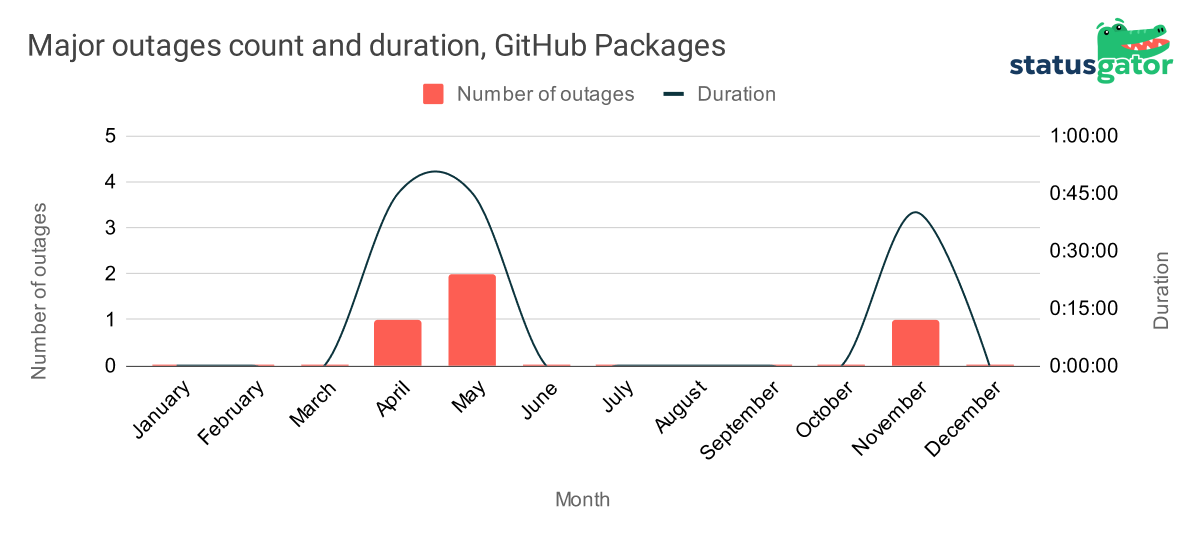
Relative to other features, these major outages did not last as long and were all under an hour. Updates seen on GitHub’s status page show April and November major outages included multiple features, which may indicate a widespread connectivity issue, which could be why these events lasted longer.
As for the minor incidents, January had the longest total duration of nearly 6 hours for 3 events, all of which were similar in duration (2 hours ± 15 minutes). May and September were two notable months for the high incident duration, with totals of 4 hours and 40 minutes and 4 hours and 10 minutes.
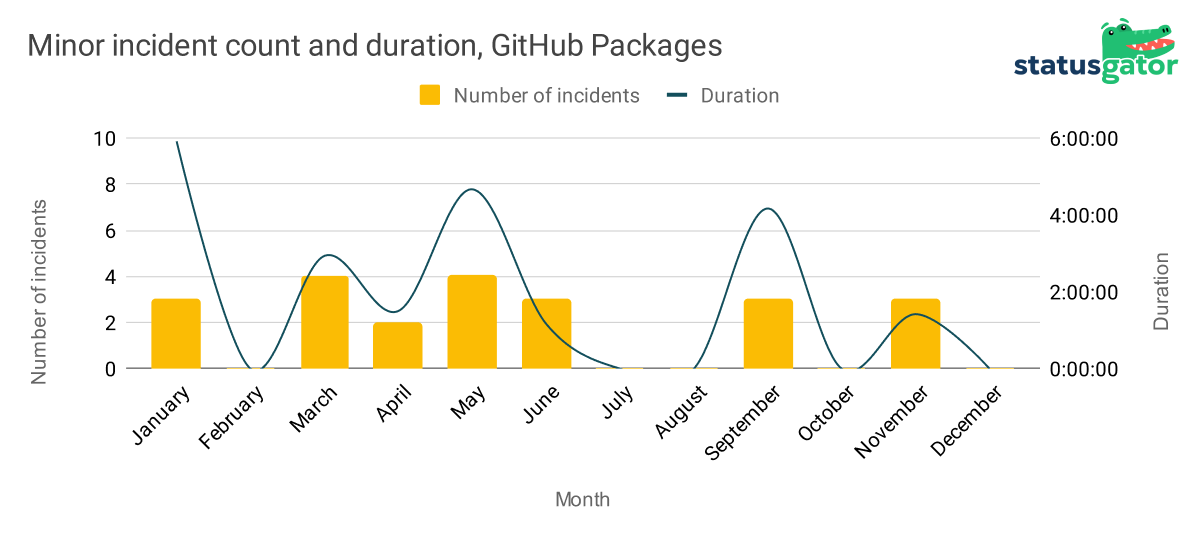
Summary of GitHub’s Most Unreliable Features
Upon analyzing our data, there were two key things to conclude about the GitHub features’ reliability: (1) which features were the most unreliable in 2022, and (2) there was a lack of transparency in Github’s incident reporting.
First, Codespaces had the highest number of major outages and minor incidents and therefore was the most unreliable GitHub feature in 2022. Also, it was top of the list for downtime duration.
Actions had a similar number of both major and minor issues as Codespaces. However, the duration of these events was significantly lower than Codespaces.
Second, we would feel more confident about judging GitHub’s reliability if more details were available in status updates for major outages and minor incidents. Typical updates from GitHub are limited to brief messages about restoration times and do not include explanations of what went wrong.
We understand that incidents occur, but transparency from GitHub would be beneficial to help establish a strong level of user trust.
To monitor GitHub status and each feature separately – try StatusGator for free.

FAQ on GitHub Reliability
Q: Is GitHub reliable?
Shortly, yes. GitHub promises a 99.9% quarterly uptime in its SLA. To review the uptime history in 2022, refer to GitHub’s status page. To view GitHub outages for a longer period use StatusGator, as it shows nearly 8 years of data in an easy-to-navigate interface. Also, if you are interested in years of outage history of a specific GitHub feature, StatusGator can help with that as well.
Q: Is GitHub’s Codespaces reliable?
The Codespaces feature, just like other GitHub features, is reliable in terms of uptime. Although, Codespaces was down more often in 2022 if compared to other GitHub features. To view Codespaces status and review years of uptime history – subscribe to StatusGator or follow the GitHub status page.
Q: How reliable is GitHub?
GitHub is quite reliable. Its SLA offers 99.9% quarterly uptime to customers. To review the uptime history in 2022, refer to GitHub’s status page. To view GitHub outages for a longer period use StatusGator, as it shows nearly 8 years of data in an easy-to-navigate interface. Also, if you are interested in years of outage history of a specific GitHub feature, StatusGator can help with that as well.
Q: How to monitor GitHub Codespaces status?
The GitHub Codespaces status is available on GitHub’s status page. To view GitHub Codespaces outages for a longer period use StatusGator, as it shows nearly 8 years of status changes in an easy-to-navigate interface.
More on GitHub Reliability

